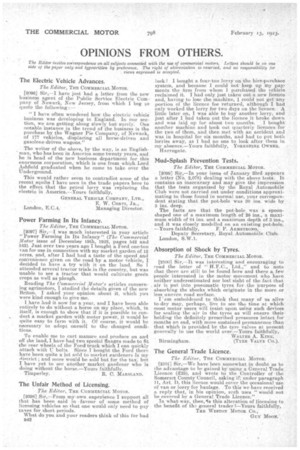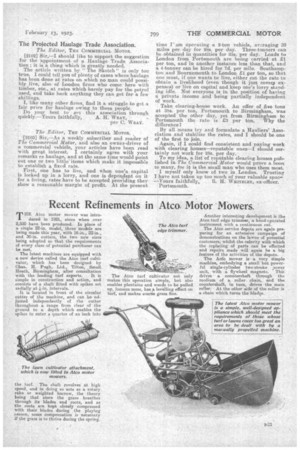OPINIONS FROM OTHERS.
Page 28

Page 29

If you've noticed an error in this article please click here to report it so we can fix it.
The Editor invites cot:respon.dence on all subjects connected with the' use of cornmercial motors. Letters should be on one side of the paper only and typewritten by preference, The right of abbreviation is reserved, and no responsibility for views expressed is accepted.
The Electric Vehicle Advances,
The Editor, THE COMMERCIAL MOTOR,
[2098] Sir,—I have just had a letter from the new busines agent of the Public Sertsiee Electric Company of Newark, New Jersey, from which I beg to quota the following :— " I have often wandered how, the electric vehicle business was developing in England. In our section, weare getting along slowly but surely. One notable instance in the trend of the business is the purchase by the Wagner Pie Company, of Newark, of 177 vehicles, displacing all horse-driven and gasolene-driven wagons."
The writer of the above, by the way, is an English-, man, who h-as been in America some twenty years, and he is head of the new business department for this enormous corporation, which is one froni which Lord Ashfield graduated when he came to take over the Underground.
This would rather seem to contradict some of the recent squibs I have seen in the trade papers here to the effect that the petrol lorry was replacing the electric in America.—Yours faithfnlly, GENERAL VEHICLE COMPANY, LTD., E. W. CONTI, JR., ' . London, E.C.4. Managing Director.
Power Farming In Its Infancy.
The Editor, THE COMMERCIAL MOTOR.
[2097] Sir,—I was much interested in your article "Power Farming In Its Infancy" (The Commercial Motor issue of December 19th, 1922, pages 542 and 543). Just over two years ago I bought a Ford onc-ton van for use in connection with my market garden of 12 acres, and, after I had had a taste of the speed and convenience given on the road by a. motor vehicle, I decided to have a try with it on the land. So I attended several tractor trials in the country, but was unable to see a tractor that would cultivate green crops as well as plough.
Reading The Commercial Motor's articles concerning agrimotore, I studied the details given of the new Briton. I asked your opinion about it, which you were kind enough to give me.
I have had it now for a year, and I have been able entirely to do without a horse on my place, which, in itself, is enough to show that if it is possible to Conduct a market garden with motor power, it would be quite easy to farm with it. Of course, it would be necessary to adopt oneself to the changed conditions.
To enable me to cart manure and produce on and off the land, I have had two special flanges made to fit the rear wheels of the Ford truck which I can quickly attach with U bolts. Since I bought the Ford there have been quite a lot sold to market gardeners in my dietrict ; and more' wonld be sold but for the tax: but I have yet to see another market gardener who is doing without the horse.—Yours faithfully, Timperley. R. 0. MARSLAND.
The Unfair Method of Licensing.
The Editor, THE COMMERCIAL MOTOR.
[2098] Sir,-From my'own experience I support all that has been said in 'favour of some method of licensing vehicles so chat one would only need to pay taxes for short periods. What do you and your readers think of this for bad I342
luck ? I bought a four-ton lorry on the hire-purchase system, and because I could notkeep up my 'payments the -firm from whom I purchased the vehicle reclaimed it. I had only just taken out a new licence and, having to lose the machine, I could not get any portion of the licence fee returned, although I had only worked the lorry for two days on the licence. A little later an, I was able to buy another lorry, and just after I had taken out the licence it. broke down and was laid up for -about two months. ,I bought another machine and took out quarterly licences for the two of them, and then met with an accident and was in hospital for six months, and had to put both lorries away, as 1 had no one to look after them in my absence.—Yours faithfully, YORKSHIRE OwerEE.
Harrogate.
Mud-Splash Prevention Tests.
The Editor, THE COMMERCIAL MOTOR.
[2099] Sir,—In your issue of ;January 23rd appears a letter (No. 2,078) dealing with the above tests. It contains an inaccuracy and may give the impression that the tests organized by the Royal Automobile Club were not carried out under canditiens approximating to those found in normal Use, your correspondent stating that the pot-hole was 30 .ins, wide by 5 ins. deep. The facts are that the pot-hole was a spoonshaped one of a maximum length of 6 ins., a maximum width of 24 ins, and a maximum depth of 3 ins., and it was closely modelled on an existing pot-hole.
—Yours faithfully, F. P. ARMSTRONG,
• Deputy Secretary, Royal. Automobile Club. London, S.W.1.
Absorption of Shock by Tyres.
The Editor, THE COMMERCIAL MOTOR.
[2100] Sir,—It was interesting and encouraging to read -the letter of " H.F.C. Ltd.," and to note that there are still to be found here and there a few people interested in the motor movement who have neitherunderestimated nor lostsight of the fact that air is put into pneumatic tyres for the purpose of absorbing the 'shocks which originate in the' more or less. uneven road surface.
I am emboldened to think that many of us alive to-day may, perhaps, live to see the time at. which most motor users will insist upon using such devices for sealing the air in the tyres as will ensure their holding the definitely prescribed pressures intact for months on end, with more sustained permanence than that which is provided by the tyre valves at present generally in use the world over.—Yours faithfully,
WALTER A. KING; •
Birmingham. (TYRE VALVE Co.).
The General Trade Licence.
The Editor, THE COMMERCIAL MOTOR.
12101] Sir,—We have. been somewhat in doubt as to the advantage to be gained by usinga General Trade Licence (225), and wrote to the Controller of the Somerset County Council, asking•if; under paragraph 11, Art, I), this licence would cover the occasional use of van or lorry for haulage. To this we have received a reply that, in his opinion, such uses " Would not be covered by a General Trade Licence."
In what way, then, "is this alteration of licensing to the benefit of the general trader 9—Yours faithfully, THE WESTON MOTOR CO.,
Guy MOON;
The Projected Haulage Trade Association.
The Editor, THE COMMERCIAL MOTOR.
[2102] Sir,—I should like to support the suggestion for the appointment of a Haulage Trade Association; it is a thing which is greatly needed.
The article written by " The Skotch" is only too true. I could tell you of plenty of cases where haulage has been done at rates on which no man could possibly live, also of London firms who come here with timber, etc., at rates which barely pay for the petrol used and take back anything they can get for a few I, like many other firms1 find it a struggle to get a fair price for haulage ,owmg to these people.
Do your best to get this association through quickly.—Yours faithfully, A. H. WRY, per C. WRAY.
The Editor, THE COMMERCIAL MOTOR.
[2103] Sir,—As a weekly subscriber and reader of The Commercial Motor, and also an owner-driver of a commercial vehicle, your articles have been read with great interest. I certainly agree with your remarks re haulage, and at the same _time would point out one or two little' items which make it impossible to establish a fixed rate.
First, one has to live, and when one's capital is locked up in a lorry, and one is depen,dent on it for a living, rates have to be accepted providing they show a reasonable margin of profit. At the present time Pam operating a 2-ton vehicle, avcraging 30 miles per day for 28s. per day. Three-tonners can be obtained in quantities for 33s. per day. Loads to London from Portsmouth are being carried at 21 per ton, and in another instance less than that, and a 4-tonner can be hired for 7d. per mile. Southamplion and Bournemouth to London 21 per ton, so that 41me must, if one wants to live, either cut the rate to obtain a livelihood (even though it just cover, 3 ex.Pensea) or live on capital and keep one's lorry standing idle. Not everyone is in the position of having al private income and being partially independent of work.
Take clearing-house work. An offer of five tons at 33s. per ton, Portsmouth to Birmingham, was accepted the other day, yet from Birmingham to Portsmouth the rate is 23 per ton. Why the difference I By all means try and formulate a Hauliers' Association and stabilize the rates, and I should be one of the first to join.
Again, if I could find consistent and paying work Mfith clearing houses—reputable ones—I. should certainly not work for .28s, per day. IiTo my idea, a list of reputable clearing houses pubI shed in The Commercial Motor would prove a boon many, for it is the small man who uses them most. I myself only know of two in London. Trusting have not taken up too much of your valuable spae.‘
Yours faithfully, R. H. WHITELEY, ex-officer. Portsmouth.
































